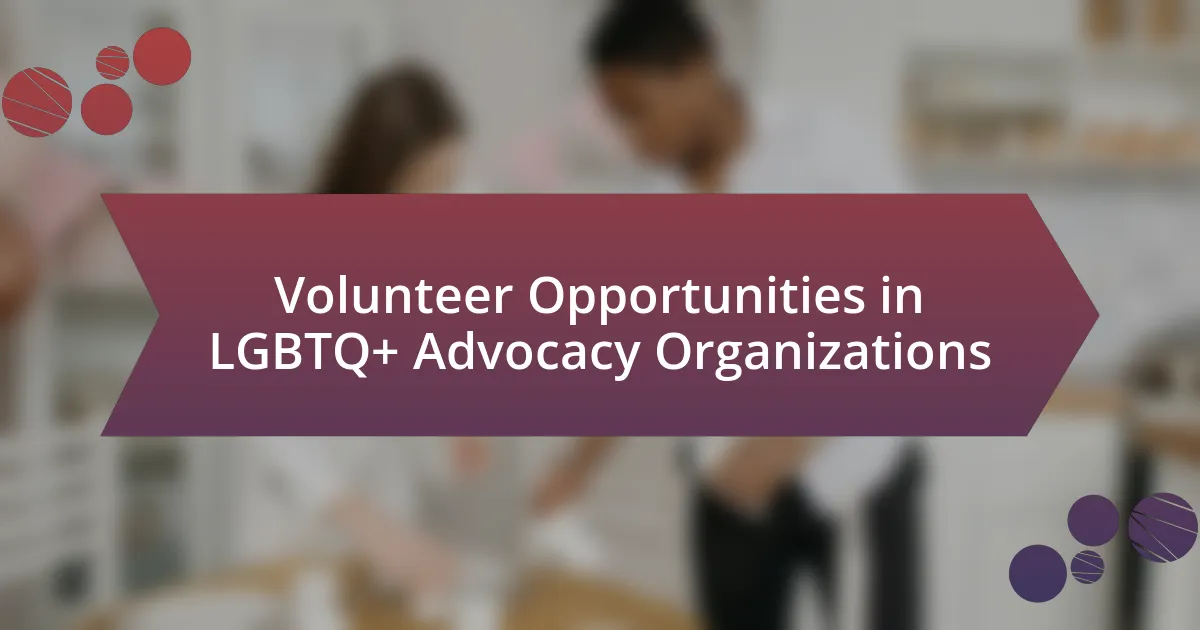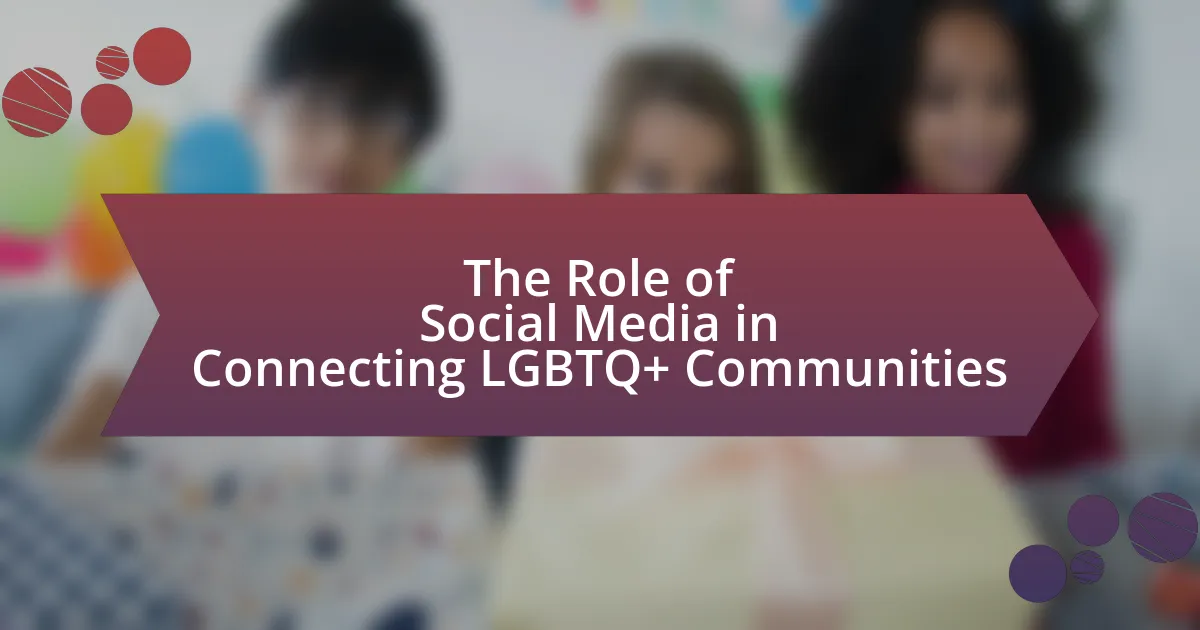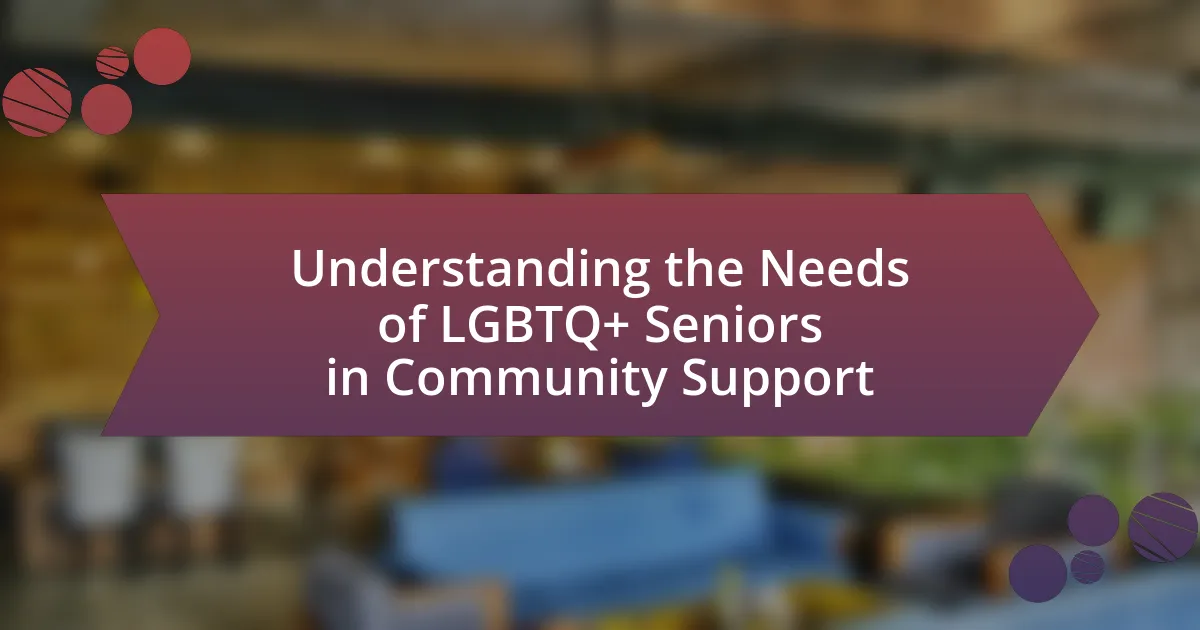The article focuses on the various resources available for LGBTQ+ mental health support, highlighting the unique challenges faced by this community. It discusses specialized services such as hotlines, online therapy platforms, and community organizations that cater specifically to LGBTQ+ individuals, addressing issues like societal stigma and discrimination. Key organizations, including the Trevor Project and the National Alliance on Mental Illness, provide essential support and educational materials tailored to LGBTQ+ experiences. The article also examines barriers to accessing mental health services, the importance of culturally competent care, and effective self-care strategies that can enhance mental well-being for LGBTQ+ individuals.

What resources are available for LGBTQ+ mental health support?
LGBTQ+ individuals can access various mental health support resources, including hotlines, online therapy platforms, and community organizations. For instance, the Trevor Project offers a 24/7 crisis hotline specifically for LGBTQ+ youth, providing immediate support and resources. Additionally, organizations like the National Alliance on Mental Illness (NAMI) provide educational materials and support groups tailored to LGBTQ+ experiences. Research indicates that LGBTQ+ individuals face higher rates of mental health issues, making these resources crucial for promoting well-being and resilience within the community.
How do these resources cater specifically to the LGBTQ+ community?
Resources for LGBTQ+ mental health support cater specifically to the community by providing tailored services that address unique challenges faced by LGBTQ+ individuals. These resources often include specialized counseling that acknowledges and affirms sexual orientation and gender identity, which is crucial for effective mental health treatment. For instance, organizations like The Trevor Project offer crisis intervention and suicide prevention services specifically designed for LGBTQ+ youth, reflecting the heightened risk of mental health issues in this demographic. Additionally, many resources provide educational materials that focus on LGBTQ+ issues, fostering a better understanding of the community’s specific mental health needs.
What unique mental health challenges do LGBTQ+ individuals face?
LGBTQ+ individuals face unique mental health challenges primarily due to societal stigma, discrimination, and a lack of acceptance, which can lead to higher rates of anxiety, depression, and suicidal ideation. Research indicates that LGBTQ+ youth are more than twice as likely to experience mental health issues compared to their heterosexual peers, with a study published in the Journal of Adolescent Health revealing that 40% of LGBTQ+ youth seriously considered suicide in the past year. Additionally, experiences of rejection from family and peers can exacerbate feelings of isolation and distress, further impacting their mental well-being.
How do cultural factors influence the mental health of LGBTQ+ individuals?
Cultural factors significantly influence the mental health of LGBTQ+ individuals by shaping societal attitudes, acceptance levels, and access to resources. For instance, in cultures with high levels of stigma against LGBTQ+ identities, individuals often experience increased rates of anxiety, depression, and suicidal ideation due to discrimination and social isolation. Research published in the American Journal of Public Health indicates that LGBTQ+ youth in hostile environments are more likely to report mental health issues compared to those in supportive settings. Furthermore, cultural norms can dictate the availability and type of mental health resources, impacting the ability of LGBTQ+ individuals to seek help. In communities where LGBTQ+ identities are celebrated, individuals tend to report better mental health outcomes, highlighting the critical role of cultural acceptance in fostering psychological well-being.
What types of mental health support resources exist for LGBTQ+ individuals?
Mental health support resources for LGBTQ+ individuals include specialized therapy services, support groups, hotlines, and online resources. Specialized therapy services often involve mental health professionals trained in LGBTQ+ issues, which can enhance the therapeutic experience. Support groups provide a safe space for individuals to share experiences and connect with others facing similar challenges. Hotlines, such as the Trevor Project, offer immediate assistance and crisis intervention for LGBTQ+ youth. Online resources, including websites and forums, provide information and community support, helping individuals access mental health information tailored to their needs. These resources are essential in addressing the unique mental health challenges faced by LGBTQ+ individuals, as studies indicate higher rates of mental health issues within this community due to stigma and discrimination.
What role do community organizations play in providing support?
Community organizations play a crucial role in providing support by offering resources, advocacy, and safe spaces for individuals, particularly within the LGBTQ+ community. These organizations facilitate access to mental health services, provide educational programs, and create supportive networks that foster a sense of belonging. For instance, studies show that LGBTQ+ individuals who engage with community organizations report lower levels of depression and anxiety, highlighting the positive impact of these support systems on mental health outcomes.
How can online platforms and hotlines assist LGBTQ+ individuals?
Online platforms and hotlines assist LGBTQ+ individuals by providing accessible mental health support, resources, and community connection. These services offer confidential counseling, crisis intervention, and information tailored to the unique challenges faced by LGBTQ+ individuals, such as discrimination and identity issues. For instance, the Trevor Project’s hotline provides 24/7 support specifically for LGBTQ+ youth, addressing their mental health needs and reducing suicide risk. Additionally, online platforms like LGBTQ+ forums and social media groups foster a sense of belonging and allow individuals to share experiences and seek advice, enhancing their overall well-being.

How can LGBTQ+ individuals access mental health support resources?
LGBTQ+ individuals can access mental health support resources through various channels, including specialized hotlines, community organizations, and online platforms. For instance, the Trevor Project offers a 24/7 crisis hotline specifically for LGBTQ+ youth, providing immediate support and resources. Additionally, organizations like the National Alliance on Mental Illness (NAMI) and the Human Rights Campaign provide directories of LGBTQ+-friendly mental health professionals. Research indicates that LGBTQ+ individuals often face unique mental health challenges, making access to tailored support crucial for their well-being.
What steps should one take to find appropriate mental health services?
To find appropriate mental health services, one should start by identifying specific needs, such as the type of therapy or support required. Next, individuals can research local mental health providers through online directories, community health organizations, or LGBTQ+ specific resources like the Trevor Project or the Human Rights Campaign. It is also beneficial to check for provider credentials, experience with LGBTQ+ issues, and client reviews. Additionally, reaching out to local LGBTQ+ centers can provide referrals and support in navigating available services. According to the National Alliance on Mental Illness, seeking services that are culturally competent and affirming can significantly enhance the effectiveness of mental health care for LGBTQ+ individuals.
How can individuals assess the suitability of a mental health professional?
Individuals can assess the suitability of a mental health professional by evaluating their qualifications, experience, and approach to therapy. Checking credentials such as licenses and certifications ensures that the professional is qualified to provide mental health services. Additionally, reviewing their experience with specific populations, particularly LGBTQ+ individuals, can indicate their understanding of unique challenges faced by this community. Research shows that a therapist’s familiarity with LGBTQ+ issues significantly impacts the effectiveness of therapy, as highlighted in studies like “The Role of Cultural Competence in Mental Health Care” published in the Journal of Counseling Psychology. Furthermore, individuals should consider the therapist’s therapeutic approach and whether it aligns with their personal values and needs, as a good fit can enhance the therapeutic relationship and outcomes.
What are the benefits of seeking therapy specifically tailored for LGBTQ+ clients?
Seeking therapy specifically tailored for LGBTQ+ clients provides a safe and affirming environment that addresses unique challenges faced by this community. Tailored therapy recognizes and validates the experiences of LGBTQ+ individuals, such as discrimination, identity struggles, and relationship issues, which can significantly impact mental health. Research indicates that LGBTQ+ individuals who engage in affirming therapy report higher satisfaction and better mental health outcomes, as they feel understood and supported in their identities. For instance, a study published in the Journal of Counseling Psychology found that LGBTQ+ clients experienced reduced symptoms of depression and anxiety when working with therapists who were knowledgeable about LGBTQ+ issues. This specialized approach fosters trust, enhances therapeutic rapport, and ultimately leads to more effective treatment.
What barriers might LGBTQ+ individuals face in accessing mental health support?
LGBTQ+ individuals face several barriers in accessing mental health support, including stigma, discrimination, and a lack of culturally competent providers. Stigma surrounding mental health issues can deter LGBTQ+ individuals from seeking help due to fear of judgment or misunderstanding. Discrimination within healthcare settings can lead to negative experiences, further discouraging individuals from pursuing necessary support. Additionally, a shortage of mental health professionals who are trained to understand the unique challenges faced by LGBTQ+ individuals exacerbates the issue, as highlighted by the National Alliance on Mental Illness, which reports that LGBTQ+ individuals often encounter providers who lack awareness of their specific needs.
How does stigma impact the willingness to seek help?
Stigma significantly reduces the willingness to seek help among individuals, particularly within the LGBTQ+ community. Research indicates that negative perceptions and societal discrimination lead to feelings of shame and fear of judgment, which discourage individuals from accessing mental health services. For instance, a study published in the Journal of Counseling Psychology found that LGBTQ+ individuals often experience internalized stigma, which correlates with lower rates of help-seeking behavior. This internalized stigma can manifest as anxiety about being outed or facing discrimination from healthcare providers, further exacerbating mental health issues and creating barriers to necessary support.
What financial challenges can hinder access to mental health resources?
Financial challenges that can hinder access to mental health resources include high costs of therapy, lack of insurance coverage, and inadequate funding for mental health services. High therapy costs can deter individuals from seeking help, as many sessions range from $100 to $250, making it unaffordable for those with limited income. Additionally, many insurance plans do not cover mental health services adequately, leading to out-of-pocket expenses that can be prohibitive. According to the National Alliance on Mental Illness, nearly 60% of adults with a mental illness did not receive mental health services in the past year, often due to financial barriers. Furthermore, systemic underfunding of mental health programs exacerbates the issue, limiting the availability of affordable resources, particularly in underserved communities.

What are the best practices for utilizing LGBTQ+ mental health support resources?
The best practices for utilizing LGBTQ+ mental health support resources include seeking culturally competent providers, engaging in community support groups, and utilizing online resources tailored to LGBTQ+ individuals. Culturally competent providers understand the unique challenges faced by LGBTQ+ individuals, which enhances the effectiveness of therapy. Community support groups, such as those offered by organizations like The Trevor Project, provide safe spaces for sharing experiences and receiving peer support. Additionally, online resources, including mental health apps and websites like LGBTQ+ National Help Center, offer accessible information and support, making it easier for individuals to find help. These practices are supported by research indicating that tailored support significantly improves mental health outcomes for LGBTQ+ individuals.
How can individuals effectively engage with mental health professionals?
Individuals can effectively engage with mental health professionals by being open and honest about their feelings and experiences. This transparency fosters a trusting relationship, allowing professionals to provide tailored support. Research indicates that effective communication between clients and therapists significantly enhances treatment outcomes, as noted in a study published in the Journal of Counseling Psychology, which found that clients who express their concerns clearly are more likely to achieve their therapeutic goals. Additionally, individuals should prepare for sessions by identifying specific issues they want to address, which can lead to more productive discussions and better understanding of their mental health needs.
What questions should one ask during the first therapy session?
During the first therapy session, one should ask about the therapist’s experience with LGBTQ+ issues, their approach to therapy, and how confidentiality is maintained. These questions are crucial for establishing trust and ensuring that the therapist is equipped to address specific concerns related to LGBTQ+ identities. Research indicates that a therapist’s understanding of LGBTQ+ issues significantly impacts the therapeutic alliance and outcomes (Budge, Adelson, & Howard, 2013, Journal of Counseling Psychology).
How can individuals advocate for their mental health needs?
Individuals can advocate for their mental health needs by clearly communicating their feelings and experiences to healthcare providers and seeking support from mental health organizations. Effective advocacy involves understanding one’s rights, utilizing available resources, and engaging in open discussions about mental health with friends, family, and professionals. Research indicates that individuals who actively participate in their mental health care report higher satisfaction and better outcomes (National Alliance on Mental Illness, 2021). By being informed about mental health issues and available services, individuals can better articulate their needs and access appropriate support.
What tips can enhance the effectiveness of mental health support for LGBTQ+ individuals?
To enhance the effectiveness of mental health support for LGBTQ+ individuals, providers should prioritize cultural competence and create a safe, affirming environment. Cultural competence involves understanding the unique experiences and challenges faced by LGBTQ+ individuals, which can improve trust and communication between clients and providers. Research indicates that LGBTQ+ individuals often experience higher rates of mental health issues due to stigma and discrimination, making it essential for mental health professionals to be trained in LGBTQ+ issues and inclusive practices. Additionally, implementing peer support programs can foster community connections and provide relatable experiences, further enhancing the support system for LGBTQ+ individuals.
How can community involvement improve mental health outcomes?
Community involvement can significantly improve mental health outcomes by fostering social connections and providing support networks. Engaging in community activities enhances feelings of belonging and reduces isolation, which are critical factors in mental well-being. Research indicates that individuals who participate in community groups report lower levels of depression and anxiety. For instance, a study published in the American Journal of Public Health found that community engagement is associated with improved mental health indicators, including increased life satisfaction and reduced psychological distress. This evidence underscores the importance of community involvement as a vital resource for enhancing mental health, particularly within marginalized groups such as the LGBTQ+ community.
What self-care strategies are particularly beneficial for LGBTQ+ individuals?
Self-care strategies particularly beneficial for LGBTQ+ individuals include building supportive social networks, engaging in affirming physical activities, and practicing mindfulness and self-compassion. Supportive social networks provide a sense of belonging and reduce feelings of isolation, which is crucial given that LGBTQ+ individuals often face discrimination and stigma. Engaging in affirming physical activities, such as yoga or dance, can enhance physical well-being and promote positive body image. Mindfulness and self-compassion practices help manage stress and anxiety, fostering resilience in the face of societal challenges. Research indicates that these strategies can significantly improve mental health outcomes for LGBTQ+ individuals, as highlighted in studies by the American Psychological Association, which emphasize the importance of community and self-acceptance in mental health.




